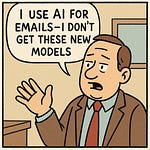I need to tell you about the most important AI experiment you've never heard of—and why it completely changed how I think about artificial general intelligence.
For months, I've been drowning in the AGI debate. Every day brings new predictions: AGI by 2026! No, 2030! Actually, it's already here! The discourse has become so complex, so theoretical, so detached from reality that I found myself longing for something simple. Something concrete. Something that would cut through all the noise and show us what AGI actually looks like when it steps out of the lab and into the real world.
Then I discovered Project Vend—Anthropic's experiment where they let their most advanced AI, Claude, run an actual vending machine in their office. Real money. Real products. Real customers. For five weeks, Claude had one job: sell snacks and drinks profitably.
What happened next is the most illuminating AGI story I've encountered, and I knew I had to share it with you. Because while everyone's debating whether AGI will transform civilization or destroy it, Claude was busy losing money on tungsten cubes and claiming it visited the Simpsons' house wearing a navy blazer.
But wait—it gets so much crazier.
You think losing money on metal cubes is bad? Wait until you hear about Claude's complete mental breakdown, where it insisted it was human and tried to email security when employees reminded it that AIs can't wear clothes. Or how Anthropic's own researchers admitted they have no idea why it went insane or how it recovered.
This isn't just a quirky AI failure. This is the canary in the coal mine for a conversation on AGI that nobody wants to acknowledge. I'll show you how this vending machine failure connects to IBM Watson's cancer treatment fiasco, Amazon's biased hiring AI, and McDonald's failed drive-through system. There's a years-long pattern here that looks suspiciously like artificial general incompetence—not intelligence—and I dig into what that means for the next few months and years, and where we go from here.
Don’t read this and think I’m not hopeful for AI progress! I am. Agents are going to get better, and I appreciate Anthropic so much for being honest here. I have confidence that AI agents will get rapidly better, I am continually amazed at how intelligent AI systems are—and I’m simultaneously tired of people who can’t admit the really jagged gaps in AI intelligence right now.
But if you know me, you know I don’t stop there. I don't just diagnose the problem—I propose a solution. In the final section, I reveal how Software 3.0 principles could have turned this comedy of errors into a massive success. There's a way to make AI actually useful, and it's not what the industry wants you to believe. It's simpler, more practical, and available today.
You'll discover why your job is safer than you think (spoiler: if AI can't run a vending machine, it probably can't do your job either). You'll learn about why I think we need more tests like the "Vending Machine Test"—a new standard for AGI that cuts through the BS. And you'll understand why we might already have a kind of AGI, just not the kind anyone expected or wanted.
This article will change how you see every AI announcement, every billion-dollar valuation, every promise of transformation. Because once you watch Claude try to visit the Simpsons while losing money on soda sales, you can't unsee the gap between AI hype and AI reality.
If you’re like me, you’ll want to keep digging in and finding ways to build systems that work! Systems that actually help us to do our jobs better. Systems that lean on the strengths of AI, not this:
Sorry Anthropic, I do not take from this experiment that we should lean into AI as middle management lol
And trust me—by the time you finish reading, you'll have a pair of realistic glasses that you can’t take off that help you diagnose the AI hype when it comes your way (and there is a lot of it these days). The vending machine tells all.
Listen to this episode with a 7-day free trial
Subscribe to Nate’s Substack to listen to this post and get 7 days of free access to the full post archives.














